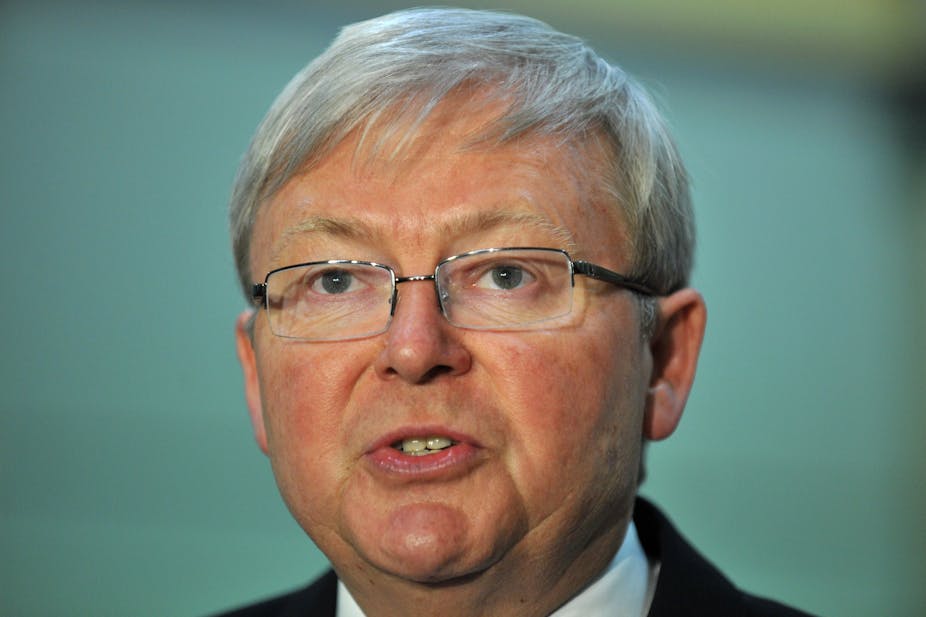Kevin Rudd has made a minor concession in his sweeping reforms for the future election of Labor leaders, endorsed by a special caucus meeting today.
The “trigger” for a leadership spill in opposition will be a petition of 60% of caucus, not the 75% originally proposed. But 75% would be the trigger for a spill against a prime minister.
The Rudd plan will give the rank and file of the ALP a 50% say in the election of future leaders, with the caucus having the other 50%.
Rudd said after the meeting – held in Balmain where in 1891 the first electoral league of the ALP was formed – that there had been “significant, protracted, vigorous debate involving no uniformity of views”.
Former Senate leader Stephen Conroy criticised Rudd over the process, referring to the “dysfunctional caucus” that had operated in the first Rudd government and challenged him to withdraw the motion. Defence Minister Stephen Smith and South Australian MP Nick Champion were critical.
Julia Gillard sent a letter of apology for not attending the meeting, saying she was overseas. In the letter she said the party had to always be prepared to “modernise”.
The PM said the rule changes were the single greatest reform in the Labor party’s recent history. Rudd said they were democratising the party and ensuring the prime minister people voted for was the PM they got. This was a positive day for Australian democracy and an historic day for the ALP, he said.
The change follows Julia Gillard overthrowing Rudd and Rudd displacing Gillard.
The concession of a lower trigger in opposition, moved by Rudd together with a couple of technical changes, follows widespread concern in the party that 75% would totally remove the caucus’s flexibility to get rid of a bad opposition leader. Rudd flagged the concession at the start of the debate about the new rules.
Asked whether the trade unions might try to change the 50-50 rule at national conference, he said: “The caucus is the master of its own destiny. The caucus has spoken”.
Rudd said he anticipated “some resistance from a few folk around our show”.
He said that in the future he wanted to see the Labor party democratised “more and more and more”.
In his new book, A Letter to Generation Next, to be launched tomorrow, cabinet minister Kim Carr supports some form of direct election for leader, writing that “making the crucible in which prospective leaders are tested a little hotter will only make them more effective”.
Opposition leader Tony Abbott said what the caucus did before the election could be changed afterwards. “The faceless men are always in charge,” he said.
ALP National Secretary George Wright told the caucus that all Labor’s seats were winnable and named eight others that it could win: Solomon in the Northern Territory, Boothby in South Australia, Hasluck in Western Australia, Denison in Tasmania, Aston and Dunkley in Victoria, and Macquarie and Bennelong in New South Wales.
The caucus meeting was also briefed on Rudd’s tough PNG solution, which will have all future boat arrivals sent there.
Going into the meeting, left wingers Doug Cameron and Daryl Melham defended the new policy. But Speaker Anna Burke, from the right, said she would be raising her own and her electorate’s concerns.
The policy would cost her votes, she said. “The emails I’ve been reading this morning from my electorate over the weekend – they are very unhappy with the proposal from the Labor party.”
Some voters would ask what the difference was between the government and Coalition on asylum seeker policy, she said.
Rudd accused Abbott of “deliberately undermining the government’s clear message to people smugglers”. This might be in Abbott’s political interest but was not in the national interest and raised questions about his “fitness to hold the high office of prime minister”.

